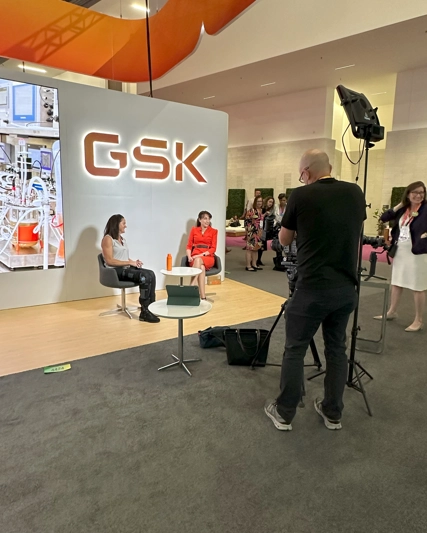GSK to present data from its innovative oncology portfolio at ESMO Congress 2019
Issued: London UK
- Presentations across nine tumour types demonstrates significant progress in accelerating GSK’s oncology pipeline
- Full results from the pivotal PRIMA study of Zejula (niraparib) in ovarian cancer to be presented in a Presidential Symposium
- New data from the INDUCE-1 study of GSK ‘609 – an ICOS receptor agonist in head and neck squamous cell carcinoma
GSK today announced that data from its growing oncology pipeline will be presented at the European Society for Medical Oncology Congress in Barcelona, Spain, September 27 - October 01, 2019. Data spans nine tumour types, including ovarian and head and neck cancers, and highlight a diverse portfolio of potentially transformational medicines for cancer patients in immuno-oncology, cancer epigenetics, cell therapy and synthetic lethality.
Results from the Phase 3 PRIMA (ENGOT-OV26/GOG-3012) study of Zejula (niraparib) maintenance treatment for patients with newly diagnosed advanced ovarian cancer will be presented in a Presidential Symposium. In July, positive headline results from the study demonstrated that niraparib could benefit women in the first line maintenance setting independent of biomarker status in a statistically significant and clinically meaningful way, with a safety and tolerability profile consistent with previous clinical trials. Niraparib is not currently approved by regulators in this indication.
“Our presentations at ESMO represent the first wave of data across the four focus areas of our new oncology pipeline and show the significant progress we have made in accelerating these potentially transformational medicines,” said Dr. Axel Hoos, Senior Vice President and Head Oncology R&D. “We are particularly pleased with the promising data from our late-breaking PRIMA study, which enrolled women with first-line ovarian cancer who were at high risk for recurrence.”
Data being presented at ESMO include:
Zejula (niraparib)
- Niraparib Therapy in Patients With Newly Diagnosed Advanced Ovarian Cancer (PRIMA/ENGOT-OV26/GOG 3012
A Gonzalez, #LBA1, Sep 28, 2019, 16:30 - 18:20, Barcelona Auditorium (Hall 2) - Immune-Related Gene Expression Profiling after Neoadjuvant Chemotherapy (NACT) of Ovarian High-Grade Serous Carcinoma
L M Manso, #1017P, Sep 29, 2019, 12:00 - 13:00, Poster Area (Hall 4) - Clinical Confirmation of Higher Exposure to Niraparib in Tumor vs Plasma in Patients With Breast Cancer
L Spring, #211P, Sep 29, 2019, 12:00 - 13:00, Poster Area (Hall 4) - Evaluation of Niraparib 200 mg/d as Maintenance Therapy in Recurrent Ovarian Cancer and Associated Thrombocytopenia in a Real-World US Setting
P Thaker, #1005P, Sep 29, 2019, 12:00 - 13:00, Poster Area (Hall 4)
GSK3359609: ICOS
- Inducible T cell co-stimulatory (ICOS) receptor agonist, GSK3359609 (GSK609) alone and combination with pembrolizumab (pembro): preliminary results from INDUCE-1 expansion cohorts in head and neck squamous cell carcinoma (HNSCC)
D Rischin, #1119PD, Sep 28, 2019, 08:45 – 09:45, Bilbao Auditorium (Hall 5) - Pharmacokinetic/pharmacodynamic (PK/PD) exposure-response characterization of the ICOS agonist mAb GSK3359609 (GSK609) from INDUCE-1, a phase I open-label study
M Maio, #1971P, Sep 30, 2019, 12:00 – 13:00, Poster Area (Hall 4)
Belantamab mafodotin: BCMA
- Trials in progress: DREAMM 4: A phase I/II single arm open-label study to explore safety and clinical activity of belantamab mafodotin (GSK2857916) administered in combination with pembrolizumab in patients with relapsed/refractory multiple myeloma (RRMM)
S Trudel, #1105TiP, Sep 28, 2019, 12:00 - 13:00, Poster Area (Hall 4)
GSK3326595: PRMT5
- METEOR-1: A Phase I Study of GSK3326595, a First-In-Class Protein Arginine Methyltransferase 5 (PRMT5) Inhibitor, in Advanced Solid Tumors
L Siu, #438O, Sep 29, 2019, 16:30 - 18:00, Malaga Auditorium (Hall 5)
GSK3377794: NY-ESO-1
- Epidemiology of synovial sarcoma in EU28 countries
N Joseph, #1728P, Sep 28, 2019, 12:00 - 13:00, Poster Area (Hall 4) - Trials in progress: Safety and tolerability of autologous T cells with enhanced T-cell receptors specific to NY ESO 1/LAGE 1a (GSK3377794) alone, or in combination with pembrolizumab, in advanced non-small cell lung cancer: A phase 1b/2a randomized pilot study
K L Reckamp, #1590TiP, Sep 28, 2019, 12:00 - 13:00, Poster Area (Hall 4) - NY-ESO-1 and LAGE1A – an emerging target for cell therapies in solid tumours
I Eleftheriadou, #1229P, Sep 30, 2019, 12:00 - 13:00, Poster Area (Hall 4)
GSK1795091: TLR4
- Trial in progress: A phase I, open-label study of GSK1795091 administered in combination with immunotherapies in participants with advanced solid tumors
A R Hansen, #511TiP, Sep 28, 2019, 12:00 - 13:00, Poster Area (Hall 4)
Bintrafusp alfa (M7824):
- Trials in Progress: Bintrafusp alfa (M7824) and Eribulin Mesylate in Treating Patients With Metastatic Triple Negative Breast Cancer (TNBC)(NCT03579472)
J Litton, 383TiP, Sep 29, 2019, 12:00 – 13:00, Poster Area (Hall 4)
Alliances with ZEJULA (niraparib)
- A Prospective Evaluation of Tolerability Of Niraparib Dosing Based on Baseline Body Weight (BW) and Platelet (Plt) Count: Blinded Pooled Interim Safety Data from the NORA Study
X Wu, #1004P, Sep 29, 2019, 12:00 - 13:00, Poster Area (Hall 4) - Trials in progress: A phase 3 randomized, placebo-controlled, double-blind study of niraparib plus abiraterone acetate and prednisone versus abiraterone acetate and prednisone in patients with metastatic prostate cancer (NCT03748641)
K Chi, #897TiP, Sep 30, 2019, 12:00 - 13:00, Poster Area (Hall 4) - Pre-specified interim analysis of GALAHAD: A phase 2 study of niraparib in patients with metastatic castration-resistant prostate cancer (mCRPC) and biallelic DNA-repair gene defects (DRD)
M R Smith, #LBA50, Sep 29, 2019, 8:30 - 9:45, Malaga Auditorium (Hall 5)
Indication and Usage for ZEJULA
ZEJULA is indicated for the maintenance treatment of adult patients with recurrent epithelial ovarian, fallopian tube, or primary peritoneal cancer who are in a complete or partial response to platinum-based chemotherapy.
Important Safety Information for ZEJULA
Myelodysplastic Syndrome/Acute Myeloid Leukaemia (MDS/AML), including some fatal cases, was reported in 1.4% of patients receiving ZEJULA vs 1.1% of patients receiving placebo in Trial 1 (NOVA), and 0.9% of patients treated with ZEJULA in all clinical studies. The duration of ZEJULA treatment in patients prior to developing MDS/AML varied from <1 month to 2 years. All patients had received prior chemotherapy with platinum and some had also received other DNA damaging agents and radiotherapy. Discontinue ZEJULA if MDS/AML is confirmed.
Hematologic adverse reactions (thrombocytopenia, anaemia and neutropenia) have been reported in patients receiving ZEJULA. Grade ≥3 thrombocytopenia, anaemia and neutropenia were reported in 29%, 25%, and 20% of patients receiving ZEJULA, respectively. Discontinuation due to thrombocytopenia, anaemia, and neutropenia occurred, in 3%, 1%, and 2% of patients, respectively. Do not start ZEJULA until patients have recovered from haematological toxicity caused by prior chemotherapy (≤ Grade 1). Monitor complete blood counts weekly for the first month, monthly for the next 11 months of treatment, and periodically thereafter. If haematological toxicities do not resolve within 28 days following interruption, discontinue ZEJULA, and refer the patient to a haematologist for further investigations.
Hypertension and hypertensive crisis have been reported in patients receiving ZEJULA. Grade 3-4 hypertension occurred in 9% of patients receiving ZEJULA vs 2% of patients receiving placebo in Trial 1, with discontinuation occurring in <1% of patients. Monitor blood pressure and heart rate monthly for the first year and periodically thereafter during treatment with ZEJULA. Closely monitor patients with cardiovascular disorders, especially coronary insufficiency, cardiac arrhythmias, and hypertension. Manage hypertension with antihypertensive medications and adjustment of the ZEJULA dose, if necessary.
Based on its mechanism of action, ZEJULA can cause foetal harm. Advise females of reproductive potential of the potential risk to a foetus and to use effective contraception during treatment and for 6 months after receiving their final dose. Because of the potential for serious adverse reactions from ZEJULA in breastfed infants, advise lactating women to not breastfeed during treatment with ZEJULA and for 1 month after receiving the final dose.
In clinical studies, the most common adverse reactions (Grades 1-4) in ≥10% of patients included: thrombocytopenia (61%), anaemia (50%), neutropenia (30%), leukopenia (17%), palpitations (10%), nausea (74%), constipation (40%), vomiting (34%), abdominal pain/distention (33%), mucositis/stomatitis (20%), diarrhoea (20%), dyspepsia (18%), dry mouth (10%), fatigue/asthenia (57%), decreased appetite (25%), urinary tract infection (13%), aspartate aminotransferase (AST)/alanine aminotransferase (ALT) elevation (10%), myalgia (19%), back pain (18%), arthralgia (13%), headache (26%), dizziness (18%), dysgeusia (10%), insomnia (27%), anxiety (11%), nasopharyngitis (23%), dyspnoea (20%), cough (16%), rash (21%) and hypertension (20%).
Common lab abnormalities (Grades 1-4) in ≥25% of patients included: decrease in haemoglobin (85%), decrease in platelet count (72%), decrease in white blood cell count (66%), decrease in absolute neutrophil count (53%), increase in AST (36%) and increase in ALT (28%).
GSK in Oncology
GSK is focused on maximizing patient survival through transformational medicines for people living with cancer. GSK’s pipeline is focused on immuno-oncology, cell therapy, synthetic lethality and cancer epigenetics. Our goal is to achieve a sustainable flow of new treatments based on a diversified portfolio of investigational medicines utilising modalities such as small molecules, antibodies, antibody drug conjugates and cells, either alone or in combination.
About GSK
GSK is a science-led global healthcare company with a special purpose: to help people do more, feel better, live longer. For further information please visit www.gsk.com.

